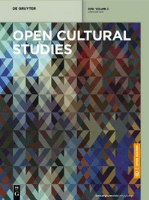
Open Cultural Studies
Scope & Guideline
Empowering Voices, Enriching Cultures
Introduction
Aims and Scopes
- Interdisciplinary Cultural Analysis:
The journal encourages research that bridges multiple disciplines, including literature, art, sociology, and environmental studies, allowing for a comprehensive understanding of cultural phenomena. - Focus on Contemporary Issues:
Research often addresses pressing contemporary issues such as disability, environmental concerns, and the impacts of pandemics, reflecting the journal's commitment to relevance and social engagement. - Exploration of Non-Human Agency:
The journal uniquely explores themes of non-human agency, particularly in relation to ecological and technological contexts, emphasizing the interconnectedness of human and non-human entities. - Intersectionality in Cultural Narratives:
Open Cultural Studies promotes discussions surrounding intersectionality, examining how various identities (e.g., gender, race, class) interact within cultural narratives and practices. - Cultural Translation and Adaptation:
The journal includes research on cultural translation and adaptation processes, particularly how cultural products are transformed across different contexts and languages.
Trending and Emerging
- Ecocriticism and Environmental Studies:
Recent publications highlight a growing interest in ecocriticism, exploring the interactions between culture and the environment, and emphasizing the importance of non-human agency and ecological awareness. - Disability Studies:
There is an emerging focus on disability studies, examining representations of disability in literature and media, as well as societal attitudes towards disability, reflecting a broader cultural dialogue. - Cultural Responses to Pandemics:
The journal has increasingly published works that analyze cultural narratives surrounding pandemics, particularly COVID-19, assessing how literature and media respond to and shape societal understandings of health crises. - Transnational and Postcolonial Perspectives:
There is a trend towards exploring transnational identities and postcolonial critiques, reflecting the complexities of migration and cultural exchange in a globalized world. - Digital Culture and Technology:
Emerging themes include the impact of digital culture and technology on human interaction and cultural practices, highlighting how virtual environments shape contemporary cultural experiences.
Declining or Waning
- Traditional Literary Criticism:
There appears to be a waning interest in conventional literary criticism, as the journal increasingly favors interdisciplinary approaches that incorporate broader socio-cultural contexts. - Historical Perspectives:
Themes focused on historical analysis, particularly those that do not connect to contemporary issues, have become less frequent, indicating a shift towards more current and applicable cultural studies. - Static Cultural Practices:
Research that examines static or traditional cultural practices without considering their dynamic nature and transformation in modern contexts is becoming less prevalent. - Overemphasis on Western Canon:
The journal has shifted away from an overemphasis on the Western literary canon, as it increasingly seeks to diversify perspectives and include global cultural narratives. - Narrowly Defined Gender Studies:
While gender studies remain a significant theme, there is a noticeable decline in research that does not engage with broader intersectional frameworks, suggesting a movement towards more inclusive and expansive discussions.
Similar Journals

Altre Modernita-Rivista di Studi Letterari e Culturali
Bridging Diverse Voices in Academic ConversationAltre Modernita-Rivista di Studi Letterari e Culturali, published by Milano University Press, serves as a significant platform in the fields of Cultural Studies, Linguistics, and Literature. Since its transition to Open Access in 2009, this journal has made strides in democratizing knowledge, ensuring that resources and research are accessible to a broader audience. With an ISSN of 2035-7680, it publishes innovative research and critical discourse aimed at fostering interdisciplinary dialogue within the humanities. Although currently positioned in Q4 and Q3 quartiles, Altre Modernita is steadily contributing to academic conversation, promoting literary analysis, cultural critique, and linguistic exploration. Located in Italy, it invites contributions from scholars worldwide, encouraging a diverse range of perspectives. Altre Modernita remains a valuable resource for researchers, professionals, and students dedicated to understanding the complexities of modern literature and cultural narratives.
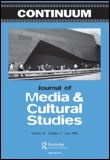
Continuum-Journal of Media & Cultural Studies
Exploring the intersections of media and culture.Continuum-Journal of Media & Cultural Studies, published by Routledge Journals, Taylor & Francis Ltd, stands as a premier platform for scholarly discourse in the fields of media studies, cultural studies, visual arts, and performing arts. With an impressive Q1 ranking in both Cultural Studies and Visual Arts and Performing Arts for 2023, this journal exemplifies scholarly excellence, attracting high-impact research and innovative ideas that contribute significantly to the academic community. The journal does not currently offer open access, but its rigorous peer-review process ensures that published articles maintain the highest standards of academic integrity and relevance. With a comprehensive coverage period from 1980 to 2024, Continuum addresses critical issues and explores diverse methodologies, making it an essential resource for researchers, professionals, and students alike. Whether you're looking to deepen your understanding of contemporary cultural dynamics or seeking to share your research with a discerning audience, Continuum provides a vital space for transformative dialogue and engagement.

Miranda
Empowering voices in social science scholarship.Miranda (ISSN: 2108-6559, E-ISSN: 2108-6559) is a distinguished open access journal published by UNIV TOULOUSE II-JEAN JAURES, dedicated to advancing knowledge across various fields of the humanities and social sciences. Since its establishment in 2010 as an open access platform, Miranda has aimed to foster inclusive academic discourse by providing unrestricted access to high-quality research. With its commitment to accessibility and scholarly excellence, this journal serves as an essential resource for researchers, professionals, and students seeking to enrich their understanding and engage with contemporary issues within their disciplines. The journal prides itself on its rigorous peer-review process and aims to publish original research, reviews, and interdisciplinary studies that contribute to the evolving landscape of humanities and social science research. Located in Toulouse, France, Miranda is poised to make a significant impact in its field and invites contributions that reflect diverse perspectives and innovative research methodologies.

Litera-Journal of Language Literature and Culture Studies
Empowering Emerging Voices in the Arts and HumanitiesLitera - Journal of Language Literature and Culture Studies is a pioneering open-access journal published by the esteemed Istanbul University, Faculty of Letters, since 2017, dedicated to the in-depth exploration and critical analysis of language, literature, and cultural studies. With an ISSN of 1304-0057 and an E-ISSN of 2602-2117, the journal aims to foster a diverse discourse within the arts and humanities, particularly in literature and literary theory, linguistics, and cultural studies. Although it currently holds a modest Scopus rank among its peers, it serves as a valuable platform for emerging scholars and seasoned researchers alike, aiming to enhance understanding and appreciation of cultural narratives within the global context. The journal provides a unique opportunity for authors and readers to engage with original research, critical reviews, and creative works that are vital to the advancement of interdisciplinary studies. Based in Istanbul, Turkey, it is positioned at the heart of cultural exchange, making it a significant contributor to scholarly communication in the region and beyond.

Cuadernos CANELA
Advancing Global Dialogue in Scholarly ResearchCuadernos CANELA is a distinguished scholarly journal published by Nanzan University and the Nanzan Institute for Religion and Culture, focusing on the interdisciplinary study of religion and culture. Operating under an Open Access model since 2012, this journal aims to foster global dialogue and accessibility in research, catering to a diverse audience of researchers, professionals, and students. With an emphasis on quality and scholarly rigor, Cuadernos CANELA plays a significant role in advancing the field by providing a platform for innovative ideas and critical discussions that address complex cultural and religious phenomena. As a journal dedicated to expanding knowledge within the intersection of religion and cultural studies, it invites contributions that explore these themes from various geographical and disciplinary perspectives. For more information on submission and access options, please visit our website.

SCHWEIZERISCHES ARCHIV FUR VOLKSKUNDE
Exploring the Rich Tapestry of Folk CultureSCHWEIZERISCHES ARCHIV FUR VOLKSKUNDE, with ISSN 0036-794X, is a vital resource for scholars and practitioners in the fields of Arts and Humanities and Cultural Studies. Published by G KREBS VERLAGSBUCHHANDLUNG AG in Switzerland, this journal plays a crucial role in advancing the discourse surrounding folk culture, traditions, and anthropology. Despite its current ranking in the Q4 category for both Arts and Humanities and Cultural Studies, the journal serves as an essential platform for disseminating unique research findings and insights, contributing to a well-rounded understanding of diverse cultural practices. Researchers, professionals, and students are encouraged to explore the rich content produced between 2008 and 2014, and from 2017 to 2023, which reflects a commitment to fostering a multidisciplinary approach to folklore studies. By addressing the complexities of cultural dynamics, the journal not only promotes scholarly engagement but also enriches the academic community’s appreciation of folk traditions.
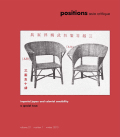
Positions-Asia Critique
Exploring the Cultural Tapestry of Asia's Past and PresentPositions-Asia Critique, published by DUKE UNIV PRESS, is a leading academic journal dedicated to exploring the intersections of cultural studies, literature, and the visual arts within Asian contexts. With an ISSN of 1067-9847 and an E-ISSN of 1527-8271, this journal has established itself as an influential platform for rigorous scholarship since its inception in 2001. It encompasses a diverse range of interdisciplinary research, addressing contemporary issues while reflecting on historical narratives, thereby contributing significantly to the fields of Cultural Studies, History, Literature and Literary Theory, and Visual Arts and Performing Arts. Notably, in 2023, it achieved Q2 rankings in Cultural Studies and History, and Q1 rankings in both Literature and Literary Theory, as well as Visual Arts and Performing Arts, positioning it within the top tiers of academic discourse. Although not an open access journal, Positions-Asia Critique provides extensive access options through institutional subscriptions, ensuring researchers, professionals, and students can engage with its innovative perspectives. As it converges towards its milestone of 2024, the journal will continue to be at the forefront of critical dialogues surrounding Asia's complex cultural landscapes.
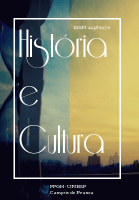
Historia e Cultura
Advancing Understanding of History and IdentityHistoria e Cultura is a distinguished open-access journal focusing on the dynamic and multifaceted exploration of history and culture within the context of the Humanities. Published by the UNIV ESTADUAL PAULISTA JULIO MESQUITA FILHO, FAC CIENCIAS HUMANAS & SOCIAIS, the journal serves as a vital resource for researchers, professionals, and students engaged in the fields of historical research and cultural studies. Since transitioning to open access in 2012, Historia e Cultura aims to democratize knowledge by providing free, unrestricted access to high-quality articles that foster scholarly exchange and innovation. Although the specific impact factor remains undisclosed, the journal is dedicated to contributing to the academic discourse through rigorous peer-reviewed research. Situated in Brazil, Historia e Cultura is well-positioned to address both local and global issues, encouraging critical engagement with cultural heritage and identity. Researchers and scholars are invited to submit their work, ensuring that diverse perspectives are represented in the study of our shared history.
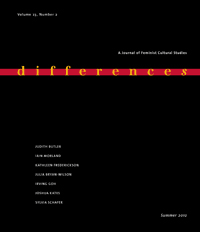
Differences-A Journal of Feminist Cultural Studies
Illuminating Diverse Voices in Cultural StudiesDifferences: A Journal of Feminist Cultural Studies is a distinguished academic journal published by DUKE UNIVERSITY PRESS, dedicated to exploring the intricate intersections of gender, culture, and society. With an ISSN of 1040-7391 and an E-ISSN of 1527-1986, this journal serves as a vital platform for feminist scholarship, contributing to critical discussions in both cultural studies and gender studies. The journal has achieved an impressive 2023 ranking in Q2 for Cultural Studies and Q3 for Gender Studies, underscoring its relevance and impact in these fields, as reflected in its Scopus rankings. Although not open access, the journal offers a range of insightful articles and research that span from its inception in 1994 to 2024, making it an essential resource for researchers, professionals, and students interested in feminist theories and cultural analysis. By publishing innovative and thought-provoking content, Differences continues to challenge dominant narratives and foster diverse voices within feminist discourse.

Cercles-Revista d Historia Cultural
Connecting scholars to the heart of cultural discourse.Cercles-Revista d Historia Cultural is a vital scholarly platform published by UNIV BARCELONA, SERVEI PUBLICACIONS, dedicated to advancing the field of cultural history through accessible research. With its Open Access model established in 1998, this journal encourages the wide dissemination of knowledge, providing a valuable resource for researchers, professionals, and students alike. Based in Barcelona, Spain, Cercles competes in the Q4 quartile rankings for both Cultural Studies and History as of 2023, and is significant within its niche, despite recent challenges reflected in its Scopus rankings and percentiles. The journal covers a spectrum of topics, promoting interdisciplinary dialogue and critical perspectives in cultural history. Aimed at fostering scholarly engagement, Cercles represents an important avenue for academic discourse and dissemination in the humanities.